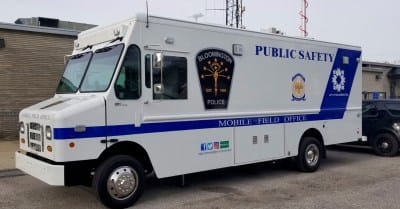Initial report from Bloomington’s future-of-policing task force leads to mobile roll calls in neighborhoods

A news release from Bloomington’s police department (BPD) on Friday announced that mobile roll calls will be conducted in neighborhoods, as a way to try to increase routine social and personal interactions between residents and police officers.

When shifts start at 5:30 a.m., 1:30 p.m., and 9:30 p.m., city residents might notice BPD’s mobile field office truck and several patrol vehicles in parking lots around the city, according to the news release.
The news release encourages residents to stop and visit with officers as they see the roll calls take place. Roll calls are when shift assignments are handed out and information briefings are given to officers.
As the impetus behind the roll calls in neighborhoods, the news release cites a “key recommendation of the April 2022 inaugural report from the community-member-led Future of Policing Task Force.”
After it was requested by The B Square in an informal email message on Friday, Bloomington director communications Andrew Krebbs provided the six-page initial report later that day.
The report’s suggestion cited in BPD’s news release as spurring the idea of conducting roll calls in neighborhoods is one of nine recommendations delivered to Bloomington mayor John Hamilton in January 2022, according to the report.
The nine recommendations were provided with a caveat that task force members had not gathered enough information for a comprehensive list of recommendations, according to the report.
The recommendation reads: “Increase social/personal interactions between officers and the public at large.”
Other recommendations include: increasing police salaries; filling all the vacancies for sworn officers (currently 20 out of 105 positions); convening a series of public meetings; finding additional channels for publicizing the good work of police officers; providing training to officers on interpersonal communication; monitoring the mental health of officers; requiring diversity training; and coordinating with the Stride Center and Centerstone staff.
The initial report from the future-of-policing task force indicates some areas of frustration.
Declining to participate in the task force’s effort were Monroe County government and the Monroe County sheriff’s office, the report said. Preferring not to participate was the Indiana University Police Department, according to the report.
The initial report also says that meetings starting in June 2021, but “there has seldom been full attendance.”
The focus groups conducted by the task force “yielded lower numbers than anticipated,” the report said.
According to the report, this is just the preliminary effort. “There is much left to be done,” the report states.
The report concludes: “Task force members are looking forward to continuing this work by not only exploring what is or is not working in other communities, but also examining the experiences of Bloomington’s residents with law enforcement agencies.”
The task force announced in May of 2021 lists 10 members. Chairing the task force was Carolyn Calloway-Thomas, who is chair of Indiana University Department of African American and African Diaspora Studies. Calloway-Thomas also serves on the Bloomington human rights commission.
City staff support for the task force comes from: Beverly Calender-Anderson, who is director of the community and family resources department; Mike Diekhoff, chief of police; and Marissa Parr-Scott, who is office manager for the community and family resources department.




Comments ()